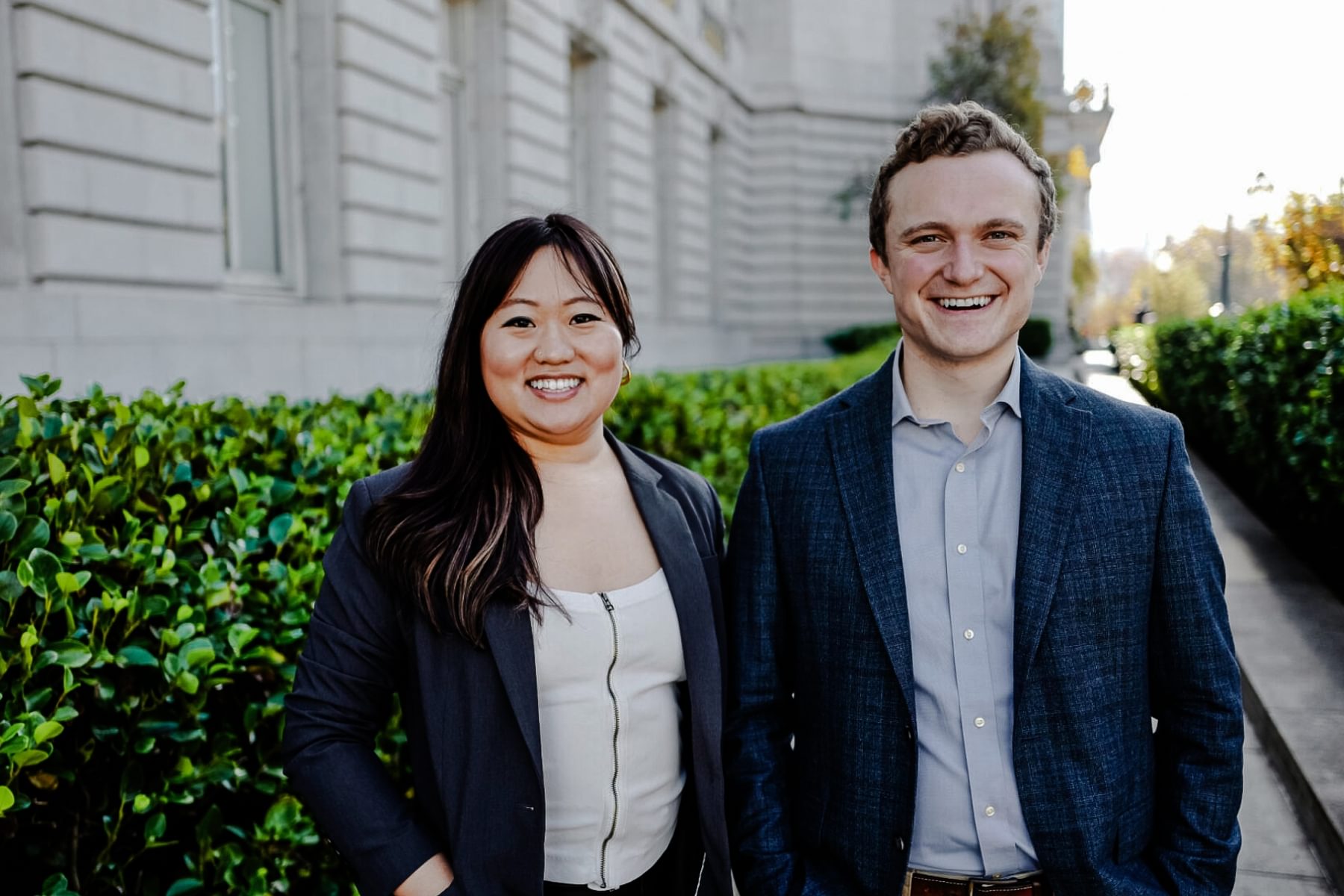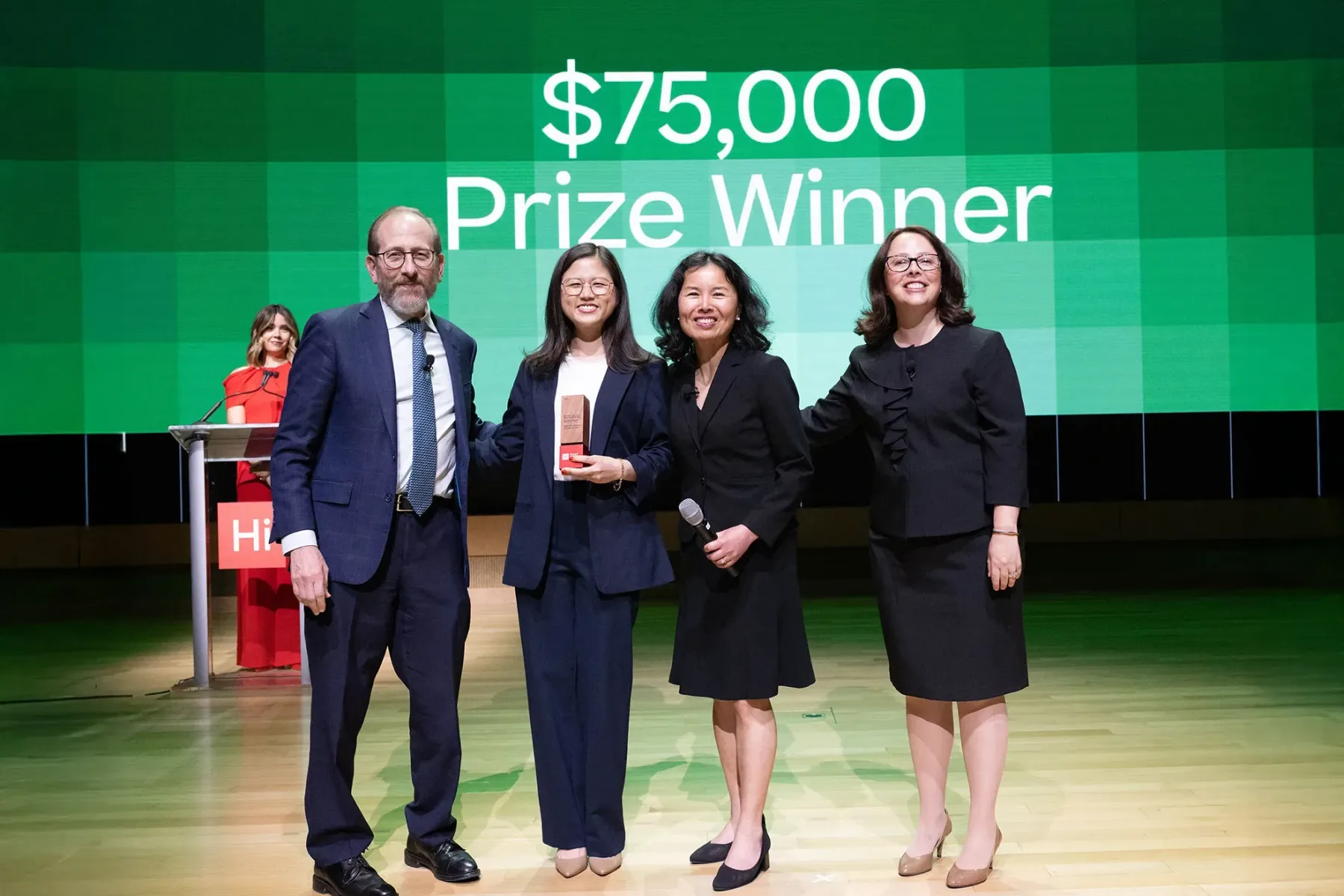Meet Ali, a father desperately trying to provide for his infant in Lebanon, a country in political turmoil and deep economic recession. Instead of accepting a food parcel and vouchers, Ali was able to buy much needed diapers and medicine for his baby thanks to BitMal, a fintech platform cofounded by Harvard Kennedy School alumni. By transforming the way philanthropic funding is distributed, BitMal is enabling people like Ali to access charitable dollars in ways that are meaningful and dignified.
Every year, there are countless examples of public and private sector funding initiatives to support the lives of vulnerable children and adults around the world. But how are communities impacted by the funding they receive, and can systems for allocating capital be reimagined to channel funds where communities need them the most?
Redha Alhaidar (HKS '14) contemplated these questions while studying at the Harvard Kennedy School a decade ago. He and his classmate, Souad Abdelhamid (HKS '14), began discussing a disconnect between the funding that donors allocate to underserved communities and the actual impact the funding has on people’s lives.
This disconnect, according to Abdelhamid, occurs in many places: Donors want to optimize the impact of their support, but often do not know what their beneficiaries really need to effectively help them. As a result, the funding often does not translate into the intended impact. Also, donors want to make sure funds are being used effectively and efficiently, but don’t have a way to track and assess the impact of their support. Finally, even if donors are buying the needed goods and services, they are often distributed in ways that the recipients find demeaning, which further diminishes their impact.
“There was a need to better institutionalize or incentivize community contribution,” explained Abdelhamid. “How do you ensure that the community wants to contribute and volunteer? How do you build a sense of self achievement within the community?”
Their initial idea was to build an online marketplace where the target community could earn points, called BitMals, through volunteering or making other contributions to their community. People in the community could then use these credits to select food, apparel, and other necessities from the BitMal marketplace.
BitMal launched their first pilot with refugees in Jordan in 2019, which then led to a series of initiatives with schools across the Arab world. In reflecting on the decade since her time at the Harvard Kennedy School, Abdelhamid shared everything from the circumstances that helped BitMal launch five years after she first spoke with her co-founder about the company, to their startup successes and learnings after commercialization, and what the future holds for the organization.
A five-year journey from idea to launch
After graduating from Harvard Kennedy School in 2014, Abdelhamid pursued a career at the World Bank Group in Washington, DC, and Alhaidar held board seats at the Misk Foundation and Tihama Group while leading civic engagement initiatives.
During this time, Alhaidar also raised funding and support to build BitMal. Alhaidar was advocating not only for the BitMal ecosystem, but for using emerging blockchain technologies to build the marketplace. As the blockchain industry matured, so did consensus for using blockchain to build BitMal.
“Sometimes, when you come up with something very innovative, it’s difficult to implement because adoption is not yet there,” explained Abdelhamid. While people were “very skeptical” about blockchain in 2014, things changed in 2018, and BitMal was chosen for a pilot as part of a World Bank Group competition. The following year, Abdelhamid left her role at the World Bank Group and co-founded BitMal with Alhaidar. The next step was building a platform for their first pilot, which would be in Jordan.



Learning from a startup’s first real-world implementation
BitMal partnered with Ruwwad Al-Tanmeya (Pioneers of Development), a nonprofit nestled inside a refugee camp in Amman, Jordan. Ruwwad Al-Tanmeya had already started a program where Palestinian refugees provided volunteer service in exchange for scholarships, which Abdelhamid described as “fully aligned with what we wanted to do.”
Abdelhamid also shared the other elements of the community that made this an ideal location for BitMal’s first implementation, including widespread adoption of mobile phones, access to the internet, and a group of volunteers who were willing to take on leadership roles.
“A big component of the community were students, and then you had the ‘moms’ from the refugee community who were extremely ambitious about wanting to do something for their family. They wanted to lead their own volunteer projects. These two were our target segments.”
When BitMal’s leadership team got these groups together to explain the concept in their first meeting, the community immediately understood the value, and were eager to implement BitMal’s reward system.
Honing a startup’s business and technology focus during expansion
After completing a six-month pilot in Jordan, BitMal launched what would become a two-year program in Lebanon.
“In Lebanon, we started with a school for Syrian refugees in Tripoli, one of the poorest poverty pockets in Lebanon,” said Abdehaamid. “They were very open to innovative ideas and wanted to do anything to support their students and teachers.”
Within the Tripoli school, BitMal focused on teachers, whose salaries had been cut from $400 to around $40 per month due to currency inflation. Low compensation made it hard to retain teachers, and BitMal worked with school leaders to help meet their basic needs. In exchange for their teaching hours, teachers would earn BitMal points that they could use to buy essential goods. “They didn't feel that this was a donation — they really felt that this was something they had worked for,” said Abdelhamid.
Abdelhamid shared that BitMal’s work in Lebanon resulted in myriad additional insights that have been essential to the organization’s continued growth:
First, to launch in Lebanon, BitMal had to rebuild its platform without the use of blockchain. Abelhamid explained, “In Lebanon, we weren’t allowed to use blockchain... [Also], blockchain was super rigid. Once you build something, it’s complicated and expensive to change anything within the platform.” So, BitMal built a marketplace using a digital points-based system that would be accepted in Lebanon.
Second, Abdelhamid and Alhaidar learned how important it is to listen to the community. With deep insights into the community's needs and preferences, they could provide the appropriate goods and services — down to the brand of food.
Last, when BitMal started working with the Tripoli school, Abdelhamid connected with Thara Pillai, director of alumni programs and engagement at the Harvard Innovation Labs, for advice. Upon seeing the many potential applications for BitMal’s marketplace, Pillai suggested focusing first on only one vertical – schools.
“I have kept telling Thara she has helped us achieve successes,” said Abdelhamid. “She taught me at that point — if you’re starting with schools, focus on schools, and achieve success with schools...We followed her advice, and that helped us to [win] a contract with Takaful Foundation, the charity arm of the Ministry of Education in Saudi Arabia.”
It is critical to understand the needs of the community through a bottom-up approach to ensure that their needs are met in a dignified manner. We have invested time and effort to understand these needs and build an incentive system to encourage them to further contribute. This ecosystem enables funders to optimize their impact in a transparent manner. The power of our solution and systems is that they can be used to support any community in different contexts.

Looking toward the future
In 2024, BitMal successfully onboarded two schools in Saudi Arabia, where they help children secure necessities from the BitMal Marketplace. Students are incentivized to volunteer and earn good grades in exchange for marketplace credits.
When building the marketplace, BitMal conducted focus groups with students to understand their needs. From there, the organization partnered with local merchants and aggregators to build the marketplace, including Jahez, one of the leading food delivery apps; NANA, the first online shopping and delivery service in Saudi Arabia; and Jareer Bookstore.
“Students earned experience, expertise, and exposure in managing their financial resources and accounts on the BitMal platform, which allowed them to positively contribute to and impact their communities,” said a director at one of the schools. "Students who volunteered felt a sense of fulfillment and achievement, and reinforced their self-value. They walked with pride and with a smile, they became known for having done something positive within their community, and they earned leadership skills that will serve them in the future.”
Abdelaziz Al Jifry, community relations lead at Jahez, added, “Our partnership with BitMal underscores our commitment to serving the community by providing seamless and efficient delivery services. We look forward to continuing our collaboration and supporting the innovative initiatives that enhance the marketplace experience for all stakeholders.”
In reflecting on the last five years, Alhaidar and Abdehlhamid are content with the time and attention to detail the BitMal team has applied to starting and growing their organization.
“It is critical to understand the needs of the community through a bottom-up approach to ensure that their needs are met in a dignified manner,” said Abdelhamid. “We have invested time and effort to understand these needs and build an incentive system to encourage them to further contribute. This ecosystem enables funders to optimize their impact in a transparent manner. The power of our solution and systems is that it can be used to support any community in different contexts.”
She added, “It’s like you’re building a house. You take the time to build the infrastructure so it doesn’t fall. And then once success comes, you’re on solid ground.”





